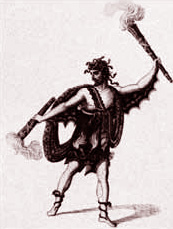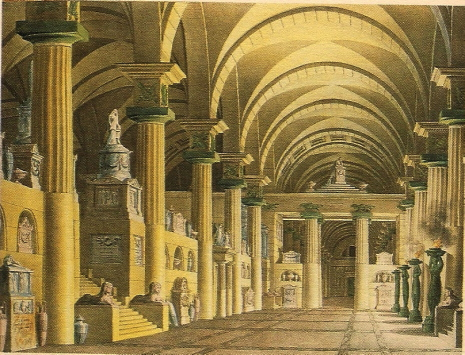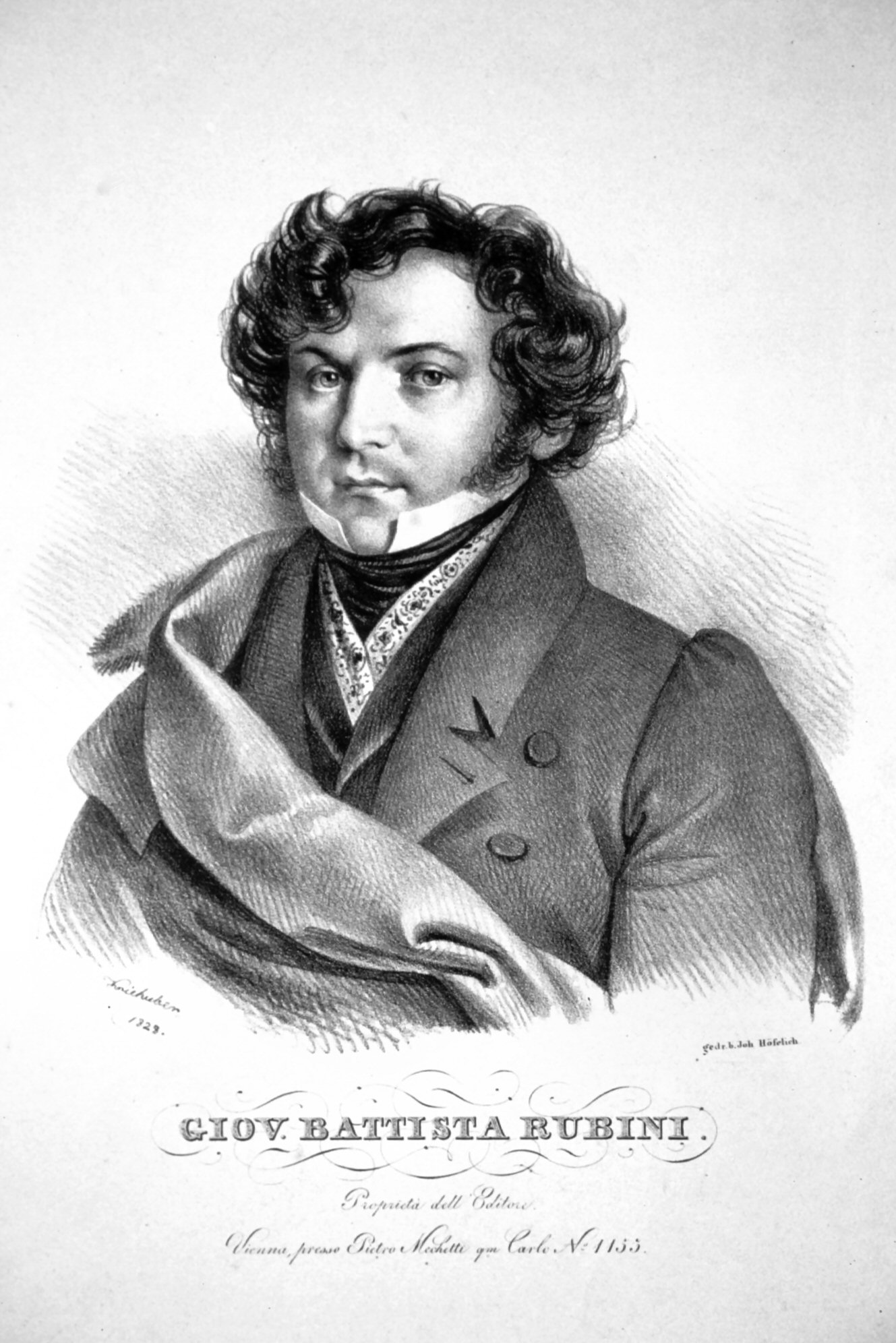|
Andrea Nozzari
Andrea Nozzari (27 February 1776 – 12 December 1832) was an Italian tenor. Nozzari was born in Vertova and studied in Bergamo and Rome. He is notable for the principal roles written for him by Gioachino Rossini and mostly premiered in Domenico Barbaia's theatres in Naples. These were: *Leicester in ''Elisabetta, regina d'Inghilterra'' (1815) *Otello in ''Otello'' (1816) *Rinaldo in ''Armida'' (1817) *Osiride in ''Mosè in Egitto'' (1818) *Agorante in ''Ricciardo e Zoraide'' (1818) *Pirro in ''Ermione'' (1819) *Rodrigo in ''La donna del lago'' (1819) *Paolo Erisso in ''Maometto II'' (1820) *Antenore in ''Zelmira'' (1822) He also premièred the title roles in Giovanni Pacini's '' Alessandro nelle Indie'' (1824) and Donizetti's '' Alfredo il grande'', and roles in operas by Michele Carafa, Manuel García, Johann Simon Mayr, Saverio Mercadante, Nicola Antonio Manfroce and Stefano Pavesi. Nozzari's voice had a baritonal quality, and his intense acting was much valued by ... [...More Info...] [...Related Items...] OR: [Wikipedia] [Google] [Baidu] |
Andrea Nozzari In Il Sogno Di Partenope
Andrea is a given name which is common worldwide for both males and females, cognate to Andreas, Andrej and Andrew. Origin of the name The name derives from the Greek word ἀνήρ (''anēr''), genitive ἀνδρός (''andrós''), that refers to man as opposed to woman (whereas ''man'' in the sense of ''human being'' is ἄνθρωπος, ''ánthropos''). The original male Greek name, ''Andréas'', represents the hypocoristic, with endearment functions, of male Greek names composed with the ''andr-'' prefix, like Androgeos (''man of the earth''), Androcles (''man of glory''), Andronikos (''man of victory''). In the year 2006, it was the third most popular name in Italy with 3.1% of newborns. It is one of the Italian male names ending in ''a'', with others being Elia ( Elias), Enea (Aeneas), Luca ( Lucas), Mattia (Matthias), Nicola (Nicholas), Tobia (Tobias). In recent and past times it has also been used on occasion as a female name in Italy and in Spain, where it is ... [...More Info...] [...Related Items...] OR: [Wikipedia] [Google] [Baidu] |
Zelmira
''Zelmira'' () is an opera in two acts by Gioachino Rossini to a libretto by Andrea Leone Tottola. Based on the French play, ''Zelmire'' by de Belloy, it was the last of the composer's Neapolitan operas. Stendhal called its music Teutonic, comparing it with '' La clemenza di Tito'' but remarking: "...while Mozart would probably, had he lived, have grown completely Italian, Rossini may well, by the end of his career, have become more German than Beethoven himself!" Performance history The first performance of ''Zelmira'' was in Naples at the Teatro di San Carlo on 16 February 1822. This was followed by a successful premiere in Vienna on 13 April 1822, as part of a three-month-long Rossini Festival for which Rossini wrote some additional music. Performances in several Italian cities were followed by the London premiere on 24 January 1824, with Rossini conducting and Isabella Colbran (now his wife) in the title role. It was seen in Paris in 1826. There was one presentation in ... [...More Info...] [...Related Items...] OR: [Wikipedia] [Google] [Baidu] |
Giovanni Battista Rubini
Giovanni Battista Rubini (7 April 1794 – 3 March 1854) was an Italian tenor, as famous in his time as Enrico Caruso in a later day. His ringing and expressive coloratura dexterity in the highest register of his voice, the ''tenorino'', inspired the writing of operatic roles which today are almost impossible to cast. As a singer Rubini was the major early exponent of the Romantic style of the ''bel canto'' era of Vincenzo Bellini and Gaetano Donizetti. Rubini is remembered as an extraordinary bel canto singer, one of the most famous in Europe in the 1820s to 1840s. He also popularized the use of a pervasive vibrato as a means of heightening the emotional impact of his operatic performances. However, if his upper register was exceptional—he could effortlessly go up to a "ringing" high F (F5) (a note that most tenors today escape because of their "chesty" technique),Green 2008, p. 167. he was reported as barely audible in the others parts of his voice and his tone was "sligh ... [...More Info...] [...Related Items...] OR: [Wikipedia] [Google] [Baidu] |
Antonio Poggi
Antonio Poggi (1806 – 15 April 1875) was an Italian operatic tenor who had an active international career from 1827–1848. He is best remembered for creating roles in the world premieres of operas by Gaetano Donizetti and Giuseppe Verdi. He was married to soprano Erminia Frezzolini from 1841–1846. Life and career Born in Castel San Pietro Terme, Poggi studied singing with Andrea Nozzari and the cello with Maestro Coticelli. He made his professional opera debut in 1827 at the Paris Opera as Rodrigo in Gioachino Rossini's ''La donna del lago''; a performance which was not well received. However, on 27 December 1827 he had a major success at the Teatro Comunale di Bologna as Peter I of Russia in Giovanni Pacini's ''Il falegname di Livronia''. This performance launched a major career for Poggi in Italy's most important opera houses. In 1828 Poggi returned to Bologna where he appeared successfully as Emerico in Carlo Coccia's ''Clotilde'' and as Lindoro in Rossini ... [...More Info...] [...Related Items...] OR: [Wikipedia] [Google] [Baidu] |
Stendhal
Marie-Henri Beyle (; 23 January 1783 – 23 March 1842), better known by his pen name Stendhal (, ; ), was a 19th-century French writer. Best known for the novels ''Le Rouge et le Noir'' ('' The Red and the Black'', 1830) and ''La Chartreuse de Parme'' ('' The Charterhouse of Parma'', 1839), he is highly regarded for the acute analysis of his characters' psychology and considered one of the early and foremost practitioners of realism. A self-proclaimed egotist, he coined the same characteristic in his characters' "Beylism". Life Born in Grenoble, Isère, he was an unhappy child, disliking his "unimaginative" father and mourning his mother, whom he passionately loved, and who died when he was seven. His closest friend was his younger sister, Pauline, with whom he maintained a steady correspondence throughout the first decade of the 19th century. His family was part of the bourgeois class and was attached to the Ancien Regime, explaining his ambiguous view toward Napoleon, t ... [...More Info...] [...Related Items...] OR: [Wikipedia] [Google] [Baidu] |
Stefano Pavesi
Stefano Pavesi (22 January 1779, Casaletto Vaprio – 28 July 1850) was an Italian composer. He is primarily known as a prolific opera composer; his breakthrough opera was Fingallo e Comala, and his acknowledged opera masterpiece is Ser Marcantonio. He also served as the ''maestro di cappella'' of Crema Cathedral from 1814 to 1818 (shared with Giuseppe Gazzaniga), and alone from 1818 (upon Gazzaniga's death) until his death at the age of 71. His first music studies were in Crema (neighboring his birthplace), followed by studies in Naples. While in Naples, Pavesi actively joined the Parthenopean Republic. After its suppression, Pavesi was denounced, imprisoned, and deported to France (allegedly Cimarosa intervened to prevent his execution). In France he played the serpent in Napoleon's army band and remained in Italy after the Battle of Marengo. He returned to Crema in 1814 after the Austrian occupation of northern Italy after the War of the Sixth Coalition. He suffered a stro ... [...More Info...] [...Related Items...] OR: [Wikipedia] [Google] [Baidu] |
Nicola Antonio Manfroce
Nicola Antonio Manfroce (20 February 1791, in Palmi – 9 July 1813, in Naples Naples (; it, Napoli ; nap, Napule ), from grc, Νεάπολις, Neápolis, lit=new city. is the regional capital of Campania and the third-largest city of Italy, after Rome and Milan, with a population of 909,048 within the city's adminis ...) was an Italian composer. His first work was a cantata for Napoleon's birthday, which was performed at the Neapolitan court on 15 August 1809. References 1791 births 1813 deaths 19th-century classical composers Italian Romantic composers Italian classical composers Italian male classical composers Italian opera composers Male opera composers People from Palmi 19th-century Italian male musicians {{italy-composer-stub ... [...More Info...] [...Related Items...] OR: [Wikipedia] [Google] [Baidu] |
Saverio Mercadante
Giuseppe Saverio Raffaele Mercadante (baptised 17 September 179517 December 1870) was an Italian composer, particularly of operas. While Mercadante may not have retained the international celebrity of Gaetano Donizetti or Gioachino Rossini beyond his own lifetime, he composed as prolific a number of works as either; and his development of operatic structures, melodic styles and orchestration contributed significantly to the foundations upon which Giuseppe Verdi built his dramatic technique. Biography Early years Mercadante was born illegitimate in Altamura, near Bari in Apulia; his precise date of birth has not been recorded, but he was baptised on 17 September 1795. Mercadante studied flute, violin and composition at the conservatory in Naples, and organized concerts among his compatriots.Michael Rose, "Mercadante: Flute Concertos", booklet accompanying the 2004 RCA CD recording with James Galway and I Solisti Veneti under Claudio Scimone. The opera composer Gioachino Ro ... [...More Info...] [...Related Items...] OR: [Wikipedia] [Google] [Baidu] |
Johann Simon Mayr
Johann(es) Simon Mayr (also spelled Majer, Mayer, Maier), also known in Italian as Giovanni Simone Mayr or Simone Mayr (14 June 1763 – 2 December 1845), was a German composer. His music reflects the transition from the Classical to the Romantic musical era. He was an early inspiration to Rossini and taught and advocated for Donizetti. Life He was born in Mendorf near Altmannstein, Landkreis Eichstätt, Bavaria, and studied theology at the University of Ingolstadt, continuing his studies in Italy from 1787. He was closely associated with the Illuminati of Adam Weishaupt while a student in Ingolstadt, and the ideals of the French Enlightenment were a strong influence on his philosophy as a musician as corroborated by his famed ''Zibaldone'' or "Notebooks" compiled toward the end of his career. Shortly thereafter, he took music lessons with Carlo Lenzi, and later with Ferdinando Bertoni. He moved to Bergamo in 1802 and was appointed ''maestro di cappella'' at the Cat ... [...More Info...] [...Related Items...] OR: [Wikipedia] [Google] [Baidu] |
Manuel García (tenor)
Manuel del Pópulo Vicente Rodriguez García (also known as Manuel García the Senior; 21 January 1775 – 10 June 1832) was a Spanish opera singer, composer, impresario, and singing teacher. Biography García was born in Seville, Spain, on 21 January 1775. In 1808, he went to Paris, with previous experience as a tenor at Madrid and Cadiz. By that year, when he appeared in the opera ''Griselda'' in Paris, he was already a composer of light operas. He lived in Naples, Italy, performing in Gioachino Rossini's operas. These included the premières of '' Elisabetta, regina d'Inghilterra'', in which he portrayed The Duke of Norfolk and ''The Barber of Seville'', in which he portrayed the role of Count Almaviva. In 1816, he visited Paris and London, England. Between 1819 and 1823, he lived in Paris, and sang in operas such as ''The Barber of Seville'', ''Otello'', and ''Don Giovanni'', often appearing at London's King's Theatre too. In the same period he presented new French-style ... [...More Info...] [...Related Items...] OR: [Wikipedia] [Google] [Baidu] |
Michele Carafa
Michele Enrico Francesco Vincenzo Aloisio Paolo Carafa di Colobrano (17 November 1787 – 26 July 1872) was an Italian opera composer. He was born in Naples and studied in Paris with Luigi Cherubini. He was Professor of counterpoint at the Paris Conservatoire from 1840 to 1858. One of his notable pupils was Achille Peri. Life and work Michele Enrico was born the second son of Giovanni Carafa, prince of Colubrano and duke of Alvito, and princess Teresa Lembo. He was given a solid musical education. In 1802, he composed his first opera, ''Il Fantasma'', which was staged at the theater of his father-in-law, prince of Caramanico, in 1805. He moved in 1806 to Paris, where he was taught composition by Luigi Cherubini and piano by Friedrich Kalkbrenner. However, pressured by his father to give up music for a military career, he became a lieutenant of the hussars in Napoleon's army. Taken prisoner in the Battle of Campo Tenese in 1806, he was freed and participated in the war ... [...More Info...] [...Related Items...] OR: [Wikipedia] [Google] [Baidu] |
Alfredo Il Grande
''Alfredo il grande'' (''Alfred the Great'') is a '' melodramma'' serio or serious opera in two acts by Gaetano Donizetti. Andrea Leone Tottola wrote the Italian libretto, which may have been derived from Johann Simon Mayr's 1818 opera of the same name. The opera tells the story of the Anglo-Saxon king Alfred the Great. This opera, with its "highly Rossini-influenced score"Osborne 1994, p. 153 was Donizetti's first exploration into British history, but it turned out to be a spectacular failure. It received its premiere on 2 July 1823 at the Teatro San Carlo in Naples, and this also became its last performance. Roles Synopsis :Time: The ninth century :Place: Isle of Athelny in Somerset Recordings *Opera Rara, 2004. ''The Young Donizetti'' disc contains the cavatina ''Non é di morte il fulmine'' sung by Bruce Ford. London Philharmonia Orchestra, conductor: David Parry. ORR 229. *Opera Rara, 1998. ''Della Jones Sings Donizetti'' contains ''Che potrei dirti, o caro?'' sun ... [...More Info...] [...Related Items...] OR: [Wikipedia] [Google] [Baidu] |





.jpg)
